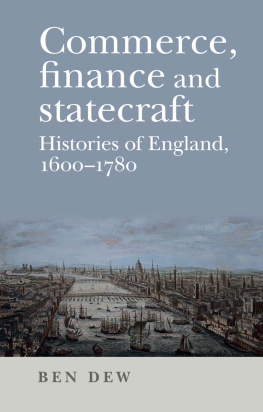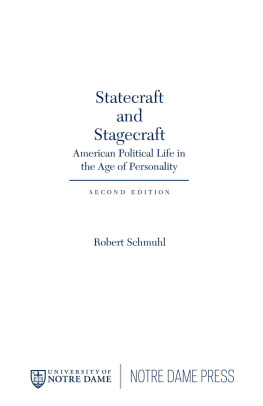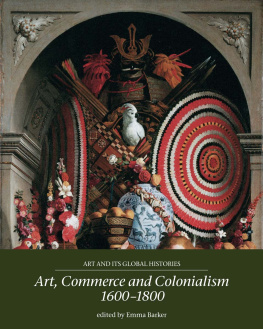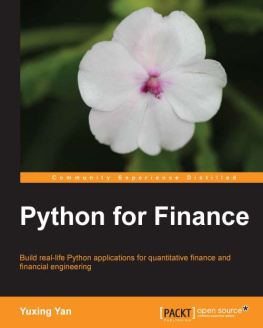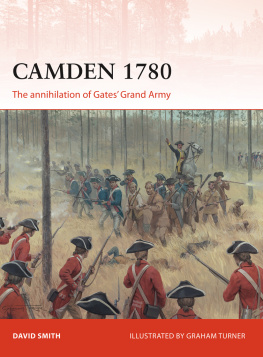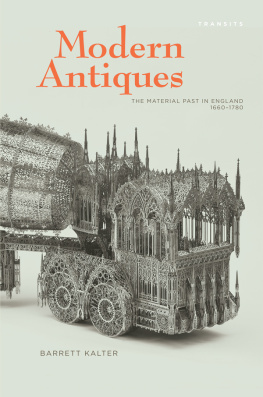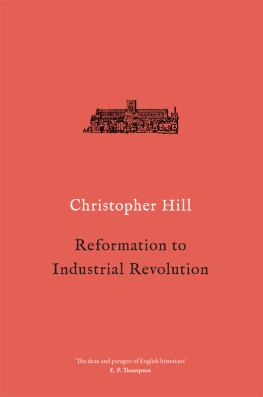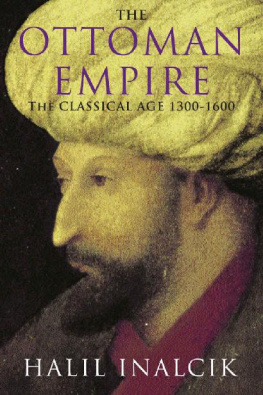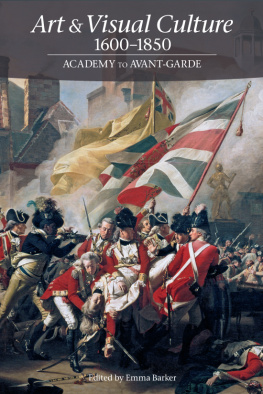Ben Dew - Commerce, finance and statecraft: Histories of England, 1600-1780
Here you can read online Ben Dew - Commerce, finance and statecraft: Histories of England, 1600-1780 full text of the book (entire story) in english for free. Download pdf and epub, get meaning, cover and reviews about this ebook. year: 2018, publisher: Manchester University Press, genre: Romance novel. Description of the work, (preface) as well as reviews are available. Best literature library LitArk.com created for fans of good reading and offers a wide selection of genres:
Romance novel
Science fiction
Adventure
Detective
Science
History
Home and family
Prose
Art
Politics
Computer
Non-fiction
Religion
Business
Children
Humor
Choose a favorite category and find really read worthwhile books. Enjoy immersion in the world of imagination, feel the emotions of the characters or learn something new for yourself, make an fascinating discovery.
- Book:Commerce, finance and statecraft: Histories of England, 1600-1780
- Author:
- Publisher:Manchester University Press
- Genre:
- Year:2018
- Rating:3 / 5
- Favourites:Add to favourites
- Your mark:
- 60
- 1
- 2
- 3
- 4
- 5
Commerce, finance and statecraft: Histories of England, 1600-1780: summary, description and annotation
We offer to read an annotation, description, summary or preface (depends on what the author of the book "Commerce, finance and statecraft: Histories of England, 1600-1780" wrote himself). If you haven't found the necessary information about the book — write in the comments, we will try to find it.
Ben Dew: author's other books
Who wrote Commerce, finance and statecraft: Histories of England, 1600-1780? Find out the surname, the name of the author of the book and a list of all author's works by series.
Commerce, finance and statecraft: Histories of England, 1600-1780 — read online for free the complete book (whole text) full work
Below is the text of the book, divided by pages. System saving the place of the last page read, allows you to conveniently read the book "Commerce, finance and statecraft: Histories of England, 1600-1780" online for free, without having to search again every time where you left off. Put a bookmark, and you can go to the page where you finished reading at any time.
Font size:
Interval:
Bookmark:

Commerce, finance and statecraft

Commerce, finance and statecraft
Histories of England, 16001780
BEN DEW
Manchester University Press
Copyright Ben Dew 2018
The right of Ben Dew to be identified as the author of this work has been asserted by him in accordance with the Copyright, Designs and Patents Act 1988.
Published by Manchester University Press
Altrincham Street, Manchester M1 7JA
www.manchesteruniversitypress.co.uk
British Library Cataloguing-in-Publication Data
A catalogue record for this book is available from the British Library
ISBN 978 1 7849 9296 5 hardback
First published 2018
The publisher has no responsibility for the persistence or accuracy of URLs for any external or third-party internet websites referred to in this book, and does not guarantee that any content on such websites is, or will remain, accurate or appropriate.
Typeset by
Servis Filmsetting Ltd, Stockport, Cheshire
For Claire
J.U.S.N
I have received a good deal of help and support while completing this study. Jessica Dyson and Bronwen Price kindly and selflessly covered my teaching duties in the spring of 2016, thereby giving me a muchneeded unofficial sabbatical. Richard Coulton and Matthew Mauger read through the bulk of the manuscript and provided detailed, perceptive and exceptionally helpful feedback. The two readers engaged by Manchester University Press offered both enthusiasm and excellent advice. The bulk of the research was completed at Senate House Library, the Bodleian Library and the British Library; I would like to thank the staff at all of these institutions.
I am also very grateful for the intellectual guidance and encouragement I have received over the years. At the University of East Anglia, I was inspired by Marina Mackay and Judy Hayden. At Queen Mary, University of London, I benefited greatly from working with Richard Bourke, Markman Ellis, Andrew Lincoln and Christopher Reid. I am also appreciative of the support I have received from Gregory Claeys, Emma Clery, Noelle Gallagher, Mark Salber Phillips and Nicholas Phillipson.
For their good cheer and enormous generosity I would like to thank Sin and Paul Brock, Vera and Francis Connolly, and Ann Brock. I am also very appreciative of the assistance I received from Patricia and Ivor Dew, and Marie Brodie. My parents Kathy and Chris have provided invaluable help, warm hospitality and excellent company.
My greatest debt is to Claire Brock who has been a willing and able discussant on all aspects of the project, a super editor, and an even better companion. Her love and friendship have made everything worthwhile.
1. Economic statecraft
This book explores the accounts of commerce and finance developed by seventeenth- and eighteenth-century historians of England. Writers of the period, I argue, were engaged in a series of long-running and politically charged debates concerning a range of economic issues: the impact of popular and arbitrary forms of government on trade; the political and economic consequences of taxation; the development and value of Englands trading companies and commercial empire; the relationship between war and commerce; and, more generally, the meaning of national prosperity and its significance for Englands security, greatness and happiness. In discussing such questions, historians sought to present kings and queens as managers of the nations monetary and trading interests, and economic issues themselves as aspects of statecraft. As a consequence, commerce and finance came to be considered alongside political and military affairs as matters in which monarchs could demonstrate their skill, virtue and even heroism. This historiographical approach, which I label the economic statecraft tradition, shaped the ways in which seventeenth- and eighteenth-century society conceived of politics, wealth and the meaning and function of the past, and helped to generate an important, but largely unexplored, variety of economic history.
Three characteristics of this mode of writing should be emphasised. First, its conceptions of commerce and finance were, in a sense, political. Writers did not view the economy as an autonomous or semi-autonomous system shaped by the forces of supply and demand. Instead, commercial and financial material was presented as a series of actions performed by government primarily the instigation of laws, commercial regulations and taxes which either helped or hindered Englands interests. Economic statecrafts key concern, therefore, was with what can best be described as the history of economic policy. Second, and largely as a consequence of this, none of the writers who discussed economic statecraft conceived of it as an independent field of study. Rather, the achievements of particular statesmen in commerce and finance were shown to be connected to their political, religious and military roles. This meant that economic statecraft formed part of a wider study of statesmanship, and understanding it involves tracing its shifting relationship with other aspects of this subject. Third, the accounts developed by historians were premised on the idea that the past provided a series of good and bad examples of economic management. Englands greatest monarchs, it was argued, through their skills in this area, had brought wealth, power and happiness to the nation. Its less successful rulers had allowed nationally beneficial forms of trade to decline and introduced morally and financially corrosive types of luxury. Consequently, their actions had weakened England in relation to its international rivals and had inaugurated periods of poverty and misery. Studying these examples was valuable as they could provide practical lessons for modern statesmen. Economic statecraft was, as a consequence, a self-consciously didactic form of writing.
The narrative that follows examines the emergence of economic statecraft in Jacobean historical writing (
In contrast to such approaches, this analysis treats historical writing about England as a subject worthy of attention in its own right and aims to show that the writers of the period developed a sophisticated form of politico-economic history. Two clarifications need to be added to such a claim. First, I am not arguing that the works under consideration were doing economic history in the modern sense of the term. There is, of course, a huge methodological gap between the approaches taken by William Camden and David Hume, and those of, say, J. H. Clapham, Phyllis Deane and W. A. Cole. I want to show that a number of these economic questions, while not perennial, have substantial histories of their own, and have been answered using the conceptual vocabulary of neoclassical narrative history, as well as the modern terminology of aggregates and forces.
Second, while the organisation of this account is broadly chronological, it does not treat the texts it discusses as a series of incremental steps through which historians gradually acquired the techniques of
2. Public and private realms
This book also contributes to wider discussions concerning historical and economic culture in the seventeenth and eighteenth centuries by developing a critique of what might be labelled neo-Aristotelian analyses of commercial modernity. Such ideas received their classic exposition in Hannah Arendts work of 1958, Vita Activa.
Arendts thesis has been highly influential. In
Font size:
Interval:
Bookmark:
Similar books «Commerce, finance and statecraft: Histories of England, 1600-1780»
Look at similar books to Commerce, finance and statecraft: Histories of England, 1600-1780. We have selected literature similar in name and meaning in the hope of providing readers with more options to find new, interesting, not yet read works.
Discussion, reviews of the book Commerce, finance and statecraft: Histories of England, 1600-1780 and just readers' own opinions. Leave your comments, write what you think about the work, its meaning or the main characters. Specify what exactly you liked and what you didn't like, and why you think so.

